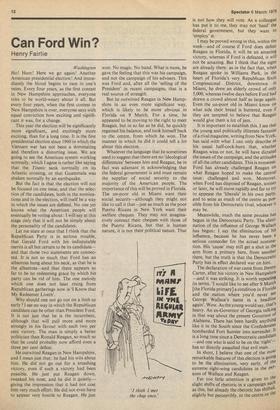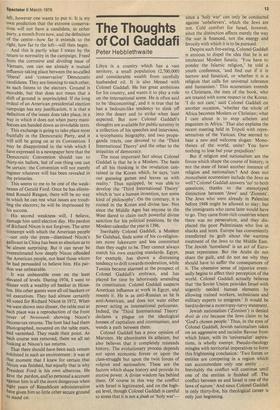Can Ford Win?
Henry Fairlie
Washington Ho! Hum! Here we go again! Another American presidential election! And immediately the blood begins to race in one's veins. Every four years, as the first contest in New Hampshire approaches, everyone tries to be world-weary about it all. But every four years, when the first contest in New Hampshire is over, everyone says with equal conviction how exciting and significant it was, for a change.
This year the election will be significantly more significant, and excitingly more exciting, than for a long time. It is the first presidential election since 1960 in which the Vietnam war has not been a dominating and therefore a distorting issue. We are going to see the American system working normally, which [agree is rather like saying that the Titanic sank normally on its Atlantic crossing, or that Guatemala was shaken normally by an earthquake.
But the fact is that the election will not be focused on one issue, and that the selection of the candidates, both in the nominations and in the election, will itself be a way in which the issues are defined. No one yet knows what the American people will eventually be voting about : I will say at this stage only that it will not be simply about the personality of the candidates.
Let me state at once that [think that the Republican Party is in serious trouble, that Gerald Ford with his indisputable merits is all but certain to be its candidate— and that those two statements are connected. It is not so much that Ford has an albatross hung about his neck, as that he is the albatross—and that there appears so far to be no redeeming grace by which his party can be rid of him. The one melody which one does not hear rising from Republican gatherings now is 'I Know that My Redeemer Liveth'.
Why should one not go out on a limb so early ? I see no way in which the Republican candidate can be other than President Ford. It is not just that he is the incumbent, although that will pull more and more strongly in his favour with each two per cent victory. The man is simply a better politician than Ronald Reagan, so much so that he could probably now afford even a three per cent defeat.
He outwitted Reagan in New Hampshire, and I mean just that : he had his wits about him. He did not go out for a smashing victory, even if such a victory had been possible. He just put Reagan down, tweaked his nose, and he did it quietly— giving the impression that it had not cost him very much effort. He did not even have to appear very hostile to Reagan. I-fe just won. No magic. No hand. What is more, he gave the feeling that this was his campaign, and not the campaign of his advisers. This was Ford and, after all the 'selling of the President' in recent campaigns, that is a real source of strength.
But he outwitted Reagan in New Hampshire in an even more significant way, which is likely to be more obvious in Florida on 9 March. For a time, he appeared to be moving to the right to meet Reagan, but in so far as he did, he quickly regained his balance, and took himself back to the centre, from which he won. The manner in which he did it could tell a lot about this election.
Whatever the language that he sometimes used to suggest that there are no 'ideological differences' between him and Reagan, he in fact was adamant in acknowledging that the federal government is and must remain the supplier of social security to the majority of the American people. The importance of this will be proved in Florida. The un-poor old in Miami want their social security—although they might not like to call it that—just as much as the poor Puerto Ricans in New York want their welfare cheques. They may not imaginatively connect their cheques with those of the Puerto Ricans, but that is human nature, it is not their political nature. That is not how they will vote. As a colleague has put it to me, they may not 'heed' the federal government, but they want to 'employ' it.
I may be proved wrong in this, within the week—and of course if Ford does defeat Reagan in Florida, it will be an amazing victory, whereas if Ford is defeated, it will not be amazing. But I think that the signs are already there: as in the fact that, when Reagan spoke in Williams Park, in the heart of Florida's very Republican Sixth Congressional District, downtown in Miami, he drew an elderly crowd of only 5,000, whereas twelve days before Ford had drawn a crowd almost half as large again. Even the un-poor old in Miami know on what side their bread is buttered, even they are tempted to believe that Reagan would give them a lot of jam.
It is important to establish this. I see that the young and politically illiterate fantasist of a rival magazine, writing from New York, has said with what I can only describe as his usual half-cock-burn that, whether Reagan wins or not, he will have dictated the issues of the campaign, and the attitudes of all the other candidates. This is nonsense. Ford has already challenged Reagan on what Reagan hoped to make the central issue: challenged and won. Moreover, when Ford has disposed of Reagan, sooner or later, he will move rapidly and far to trY to appease the 'liberals' in his own party, and to seize as much of the centre as possible from his Democratic rival, whoever it may be.
Meanwhile, much the same process has begun in the Democratic Party. The elimination of the influence of George Wallace has begun: I say the elimination of his influence, because he has never been a serious contender for the actual nomination. His 'cause' may still get a shot in the arm from a primary here, from another there, but the truth is that the Democratic Party has in effect declared war on him.
The declaration of war came from JimnlY Carter, after his victory in New Hampshire —and it was striking. It is worth repeating its terms. 'I would like to see after 9 March [the Florida primary] a condition in Florida and the nation where you'd never see George Wallace's name in a headluf again'. Wow. As the young would say, that s heavy. An ex-Governor of Georgia talking in that way about the present Governor a Alabama. There has been hardly anything like it in the South since the Confederates bombarded Fort Sumter into surrender. It is a long time since a Democratic candidate —and one who is said to be on the 'right ----has so directly assaulted that evil man. In short, I believe that one of the most remarkable features of this election is going to be the elimination, very early, of the extreme right-wing candidates in the Per" sons of Wallace and Reagan. Far too little attention is given to th,e slight shifts of rhetoric in a campaign.suon as this, but already the rhetoric has shifted, slightly but perceptibly, to the centre or the
left, however one wants to put it. It is my own prediction that the extreme conserva tives will not have a candidate, in either Party, a month from now, and the definition of the centre—how far it extends to the right, how far to the left—will then begin.
And this is partly what I mean by the return to normality in the campaign. Freed from the corrosive and dividing issue of Vietnam, one can see already a mutual influence taking place between the so-called 'liberal' and 'conservative' Democratic candidates. They are listening to each other, as each listens to the electors. Ground is
Movable, but that does not mean that a
shift of ground is unprincipled. If the long ordeal of an American presidential election campaign has any justification, it is that a definition of the issues does take place, in a way in which it does not when party mani festoes are handed down as inviolable texts.
This exchange is going to take place most fruitfully in the Democratic Party, and it will still be going on at its Convention. I may be disappointed in the wish which I have expressed in a newspaper here that the Democratic Convention should run to thirty-six ballots, but of one thing one can be certain: the Convention will not merely register whatever will has been revealed in the primaries.
This seems to me to be one of the weaknesses of Gerald Ford. Once he has elimin ated Ronald Reagan, there will be no way In which he can test what issues are troubling the electors; he will be imprisoned by his success.
His second weakness will, I believe, damage him until election day. His pardon of Richard Nixon is not forgiven. The utter contempt with which the American people —not only the press—dismissed Nixon's gallivant in China has been so absolute as to be almost surprising. But it can never be overestimated how deeply Nixon offended the American people, not least those whom he had persuaded to believe him. His pardon was unbearable.
It was unbearable even on the least elevated of levels. During 1974, I went to dinner with a wealthy oil banker in Hous ton. His other guests were all oil bankers or Oil executives. They had almost certainly all voted for Richard Nixon in 1972. When We were shown into dinner, the table mat at each place was a reproduction of the front
cover of Newsweek showing Nixon's
income-tax returns. The host had had them Photographed, mounted on the table mats, and varnished. They made their point. As each course was removed, there we all sat looking at Nixon's tax returns.
That there should have been such venom exhibited in such an environment : it was at that moment that I knew for certain that Nixon was finished, but equally that is why President Ford is his own albatross. He gave the pardon, and's() personal a account against him is all the more dangerous when eight years of Republican administration have given him so little other secure ground 10 stand on.



































 Previous page
Previous page